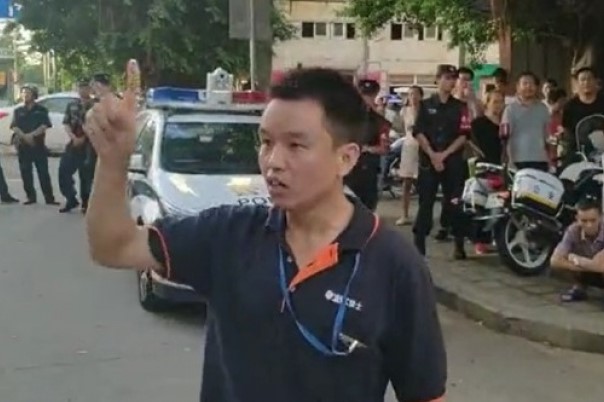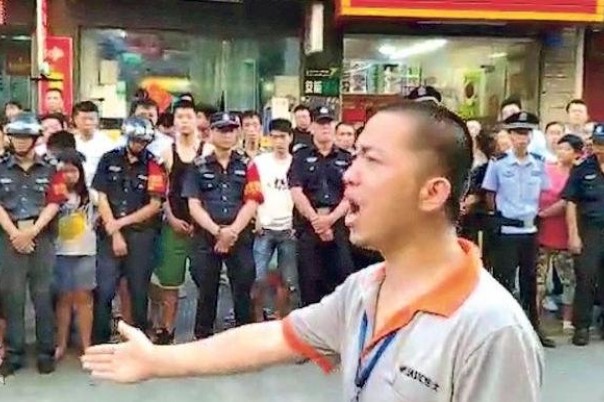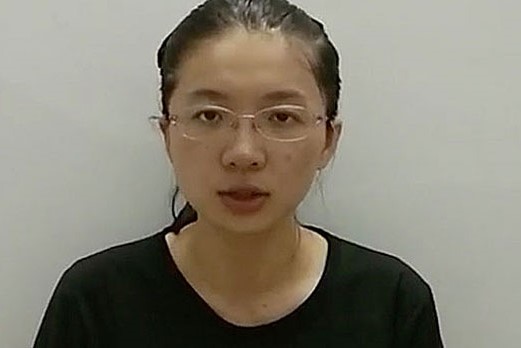Mi Jiuping, one of the central worker-leaders of the Jasic union formation effort in China’s manufacturing hub of Shenzhen, is one of four workers against whom charges have been pressed for “disturbing social order” in the course of the Jasic struggle. In the following partial translation of a Jasic Workers Support Group publication, a co-worker and released Jasic incident detainee records his recollections of Mi—a friendly uncle and worker poet who was always ready to stand up for those around him. At the end of the article is an account of Mi’s role in this year’s brave organizing effort at Jasic, including his firing and arrest.
In July of this year, Mi Jiuping was fired by his factory for organizing a union and subsequently apprehended by police for “disorderly behavior.” Many of his friends were outraged: when the boss breaks the law, no one cares, yet when workers fight for their rights according to the law, they get arrested. What kind of ethics is that?
All of us have been out working for some years. Throughout these years, we’ve constantly been trampled underfoot by the bosses. To many workers, labor law has become just a prop. Whenever someone dares to stick their neck out and fight back just a little, the bosses resort to any possible means to retaliate against them. The local government defends the bosses. They are never even objective and fair; much less do they stand on the side of the workers.
Determined to change the situation of the poor
Mi Jiuping was born in 1982 in the mountains of Hunan. A genial smile, constantly looking out for others, happy to reach out a helping hand, always caring towards friends… this is the impression most people have of Mi. Those of us who have been on the receiving end of his care and affection like to call him “Uncle Jiu.”
When he was a child, Uncle Jiu’s family was very poor. He remembers clearly one incident during primary school where the school demanded payment of five yuan. Because of his family’s poverty, Uncle Jiu was for a long time unable to pay, and his teacher told him, “If you don’t pay the five yuan, you needn’t come to school anymore.” Uncle Jiu was aware his family couldn’t afford that much money, so he stopped going to school but didn’t dare tell his family, resorting to hiding in the mountains every day.
After more than a month, Uncle Jiu’s teacher and parents found out, and after his fees were paid his teacher called him back to school. Yet this incident made Uncle Jiu reflect: why did being poor mean you couldn’t go to school?
After his middle school graduation, even though his grades were excellent, his impoverished family couldn’t support his high school education.
In an era where money dominates, poverty cost him his chance at an education.
Instead, after graduating from middle school, Uncle Jiu followed his relatives to Guangdong. Going out to work would help ease his family’s troubles, and this prospect excited him. Even though wages then were pitiably low, he saved up penny by penny, reluctant to spend.
The factories of the ’90s were all engaged in endless overtime. Workers rarely had time to leave the factory. After a few months in Guangdong, Uncle Jiu finally had half a day off and decided to take a look around outside. Not far outside the factory, he ran into a group of people searching IDs and temporary residence permits. Having forgotten to bring his documents with him on his spontaneous excursion, he was taken to a detention center and thrown into a small dark room with a few dozen other people, where he was repeatedly beaten and abused by detention center staff. It was several months before he was released.
That was before the Sun Zhigang incident in 2003, when a migrant worker died from the physical abuse he suffered in detention. Being detained and sent home was daily bread for migrant workers. One absent-minded excursion would get you locked up in a little dark room. Workers were like rats in the dark, hiding in the underground hovels of the city, secretly and carefully, timid and petty.
After getting out of the detention center, the Uncle Jiu who had once come to the city with dreams and aspirations was absorbed in contemplation—why were workers who hadn’t done anything wrong subject to this kind of unfair treatment?
These two experiences had a significant impact on Uncle Jiu. Whenever he tells these two stories now, he says, “Why are poor people always picked on willy nilly? We have to change this situation!”
That was both what he thought, and how he acted!
I am with us: all workers are one family
Uncle Jiu is someone who loves to learn. Though he has only a middle school education, he has more knowledge than many university graduates. All that knowledge is self-taught. Uncle Jiu has a little Chinese dictionary. Back before smartphones were common, whenever he would run into a question while reading he would look it up in his dictionary and write it down. He is widely read in all kinds of books: literature, history, philosophy, politics, economics, novels, poetry, and more. He is concerned with national affairs and believes that everyone shares responsibility for the fate of one’s country.
Uncle Jiu especially loves writing poetry. He says that poetry speaks our ideals and determination. The number of poems he has written over the years is enough to publish several collections. After his July 27 arrest, when the detention center demanded he write a written repentance, Uncle Jiu, not the least bit afraid, used his poetry to express his ideals and determination and wrote “I am with us”:
I am with us
I stand atop a hill,
seeing beyond the highest heavens,
the mountains crisp green,
the red sun rising.
I stand on the banks of a great river,
taking in the sight of the water,
the rolling waves
surging on endlessly.
I am a crane in a crowd of people,
I am silent beyond the outskirts,
I have lost family, love, and friendship,
I have lost all,
I have lost everything.
I will have family, love, and friendship,
I will have all,
I will have everything.
Not today,
but in the not-distant future,
I am not me,
I am with us.
Uncle Jiu is a lover of life and an optimist. Because he’s so warm and generous, co-workers often come to him for help when they run into trouble or need to borrow money. Lending out a few hundred or a thousand yuan at a time adds up, even though it’s not much each time. Knowing that he had lent out a few thousand that he hadn’t gotten back, I advised him not to lend to those he didn’t know well and to learn to say no. He said, “I know all that, but it’s not easy for any of us out here working. You work the year away and don’t make much money, I help wherever I can.”
His house is also a “public dorm.” Those without work, who need a temporary place to stay or don’t want to go back to the factory dorms, are all invited by him to stay. He’ll often say, “All of us working far from home, we need to help each other and stick together. Only that way will we not be picked on.”
A progressive worker fighting the factory with both wit and bravery
Uncle Jiu is staunch, brave, steady, and not afraid to fight.
At a factory he worked in before—the one that violated the labor law—he and some friends went to find management, hoping the factory would correct its illegal behavior, but the factory management arrogantly told them this was just how their factory was, and if they wanted they could report it to the Labor Bureau. Everyone was very angry and went to the Labor Bureau to report the factory. They thought the Labor Bureau would act on behalf of workers. But the Labor Bureau staff said, “All of China’s factories are like this. The weak can’t beat the strong. So many people can tolerate it. Why can’t you?”
Having seen the ugly face of the Labor Bureau, Uncle Jiu said to his friends, “We can’t rely on them. We have to rely on ourselves.” So they went together to the factory director’s office, filling his office with dozens of people. The director was scared silly and immediately called in at least a dozen security guards. The police also came, but they were there to help the boss and fiercely told the workers, “What you’re doing is illegal. If you don’t get back to work now, we’ll have you all arrested.”
At that critical moment, Uncle Jiu stood up and said in a loud voice, “We didn’t beat anyone or smash any machines. Which law did we violate? The one who violated the law is the boss. Did you police take a bribe from the boss?” As soon as the police saw that he understood the law and that they hadn’t managed to scare him, they retreated. Afterwards, Uncle Jiu and a few other workers went through several rounds of negotiations with the factory management. In the end, the factory agreed to respect the labor law.
“Only when we fight, and when we stand together, will workers not be picked on. Only then can have the final win.”
Uncle Jiu is always saying that. It’s the conclusion he has come to after 20 years of work. It’s also why he applied to form a union and raised his voice against Jasic Technology’s violations of the law.
In May of this year, after he heard that another worker, Yu Juncong, had been beaten by his group leader, Uncle Jiu could not suppress his fury and loudly asked management, “What did you beat him for? We’re just working a job!”
After hearing that another worker, Liu Penghua, had been injured by several unidentified figures, Uncle Jiu not only demanded that the factory provide an explanation, but also complained to the district Federation of Trade Unions, asking the FTU to uphold justice. But neither the factory nor the FTU gave him a response.
Some people said, “You’re so silly. Everyone knows that the factory is shady, but the weak can’t beat the strong. If it comes down to it you can just leave.” But Uncle Jiu would respond, “It’s the same no matter where we workers go. All crows under the sky are black. Only when we change the overall working environment will we be able to have it better.”
Some people said, “They didn’t fine you, and they beat on others, not you. It’s better to have less trouble than more.” But Uncle Jiu disagreed with them. He would say, “If I don’t speak up when others are fined, when one day I’m fined, will anyone speak up for me? When others are beaten, if I don’t stand up, later when I get beaten, who will stand up and defend me? It’s precisely because we are so numb that the factory is so despotic. To take care of others is to take care of ourselves.”
Some people said, “Of course it’s good to have a union, but the bird who sticks his neck out always gets shot. Why are you so determined to form a union?” Uncle Jiu wasn’t afraid to stick his neck out. He would tell people, “There always has to be someone who goes first. If everyone is afraid, we workers will never get our day of freedom.” “We workers have created so much wealth, but we get far too little. The factory doesn’t even treat us as people. Only when we workers are united will the factory not dare to pick on us however it pleases.”
We workers have suffered too many injustices in the city. Histories of blood and fire are not far behind us, and our reality of bitterness and weariness is before our eyes. Only when we unite and fight can we change this.
Uncle Jiu acted in line with his beliefs and was down to earth. He lives to change the situation of the poor and to fight for all workers to be able to live with dignity. He is our role model, a progressive worker who has been through many trials.
Petition, Firing, and Arrest
Mi Jiuping drafted the Jasic workers’ original petition to form a union, and a core activist throughout the Jasic union formation struggle.
In May, Mi Jiuping began to draft a petition demanding requesting that Jasic eliminate its illegal system of fines, make its unpaid mandatory employee hike optional, stop beating, cursing, and threatening workers, and allow workers to form a union. On May 10, he and co-workers Liu Penghua and Zhang Baoxin had collected 28 signatures and proceeded to submit their petition to the Pingshan District Federation of Trade Unions and Pingshan District Human Resources Bureau. The chairperson of the Pingshan District FTU gave oral approval to workers’ request to form a union.
On June 7, Mi and Liu submitted an official request to form a union to the District FTU, based on a template available on the FTU website, only to be told by the FTU that the stamp of the company was required before the workers could move ahead. After investigating trade union law, Mi and Liu found no evidence that company approval was required for union formation, but they nevertheless acted according to the union’s instructions. Knowing that they were unlikely to get the company’s stamp themselves, they repeatedly called the union to ask them to discuss the matter with the company, until on June 21, the union replied that the company had agreed to provide its stamp. Mi and Liu asked the union to send union staff to accompany them to the company’s offices to get the documents stamped. However, despite the presence of union staff, the company refused to provide its stamp.
In early July, the company began to take steps of reprisal against Mi and other union supporters. They first gave Mi a choice: accept a post reassignment or quit. Mi decided to do neither, and instead sent a call for help letter to the District FTU. Unexpectedly, the FTU’s reply to Mi’s call for help was to tell him that they had already established channels of communication with Jasic, and that he should no longer report problems to the union but directly report them to the company. Despite this rebuff by the District FTU, Mi and Liu decided to take the next step in forming a union, collecting signatures and enrolling members. In the next two days, they collected 89 signatures, representing nearly 10 percent of the factory’s workers. Had it not been for interference by the company, which threatened workers and demanded that they retract their signatures or refuse to sign, this number would have been much higher. Under pressure from the company, their membership enrollment was forced to a halt.
On July 12, after Jasic management spread rumors that Mi had tricked workers into providing their signatures, Mi published a letter online explaining the real situation. He was confronted that night by Jasic Vice President Xia Ruyi, Human Resources Administrative Director Li Hongpo, and District FTU Vice Chairman Huang Jianxun. The former yelled at Mi, while FTU Vice Chairman Huang went against his own word and said Mi’s union-building activities were illegal, asking him to apologize and denying any previous involvement by the District FTU. The next day, Mi went to the District FTU to demand that the company apologize and that the FTU stand up for workers’ legal rights and monitor the union formation process.
With no response from the FTU, days later core union activist Liu Penghua was reassigned to a new position. At his new work post he was beaten by my two mysterious men he had never seen before. Two days later, on July 18, Mi received the same reassignment order, but refused to move. The company responded by having security guards forcibly escort him and the one worker who rushed up to defend him out of the factory. Both Mi and Song, the co-worker who had rushed to his defense, were issued letters of dismissal that night. On July 20, Mi and the other fired union activists tried to return to work as usual, but were barred by security guards from entering the factory. The company called the police, who promptly arrested the workers who were simply trying to return to work. Family and friends of the workers who came to the police station to demand the workers’ release were also promptly arrested. Both the workers and their supporters were released the next day. On July 27, several days later, the workers planned another re-entry to the factory. Once again, they were promptly arrested, along with the supporters who had come to cheer them on.
Since his July 27 arrest, Mi has been able to see a lawyer only once, before the Guangdong Judiciary Bureau issued threats to not renew lawyers’ licenses if they intervened in the case. His official arrest papers were issued on August 28, on charges of “disturbing public order.”
Reposted from Labor Notes: https://labornotes.org/blogs/2018/11/jasic-detainee-1-story-worker-poet-mi-jiuping

 Liu Penghua
Liu Penghua